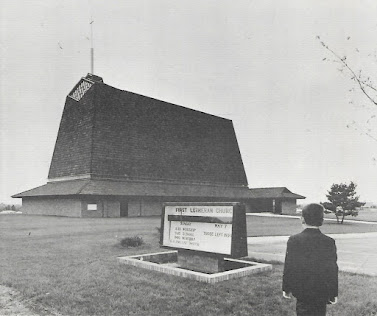Come and Witness the Abundance of Our God
By Deacon Timothy Siburg
The disciples claim, "We have nothing here but five loaves and two fish." How many times have we said similar things in our lives? "We have nothing, but a few cookies. Nothing but a few people. Nothing but a few hymnals, bibles, and an old church building." This is the language of our human created lie and sin of scarcity. This is the language of a lack.
Language of a lack of resources, a lack of assets, a lack of provision, a lack of hope, a lack of imagination, perhaps even… A Lack. Of. Faith. But Jesus says, "bring them here to me." So the disciples bring the loaves and fish. And God acts.
Jesus sees the loaves and fish as assets and things that have been entrusted to the people's care. They are resources. They are not limits, but things that can be stewarded and shared. They are ordinary things of this life through which God will do the extraordinary.
How might our worldview turn, if instead of seeing a lack of something, we might see things and assets all around us as opportunities or gifts- that we have, to meet our neighbor's needs? How might we see things in a new way- if in looking at our church buildings instead of properties to be maintained we discern that these are catalysts and centers of mission and service? Places where we might provide the resource of internet access and WIFI to local families struggling with their own resources- that might make it easier to engage in homework or teaching and learning online during this pandemic time? Places where instead of thinking about the challenge of cleaning bathrooms, we might think about how if we added a couple showers we might be able to provide shelter and refuge during the next storm, blizzard, or flood? We have such wonderful resources that God is just yearning for us, to open our whole selves to- to see and imagine with God how we might be being called to meet our neighbor’s needs.
The disciples in our story again were right to see the crowd’s needs. But they didn't ask the equally important second follow-up question. They didn't wonder, “how might we, as God’s people, meet those needs?” They instead just thought, well that's out of our control. Let's dismiss the crowd for now.
How many times are we so quick to come to similar conclusions? To look for the easiest answer to a problem or challenge, and move on?
Our story isn’t quite done though. As Jesus takes the five loaves and two fish, Jesus breaks the bread, and shares a blessing. God is thanked and praised. And God acts, so that all might be fed. More than 5000 were fed that day, so it’s a bit of a misnomer to call this the “Feeding of the 5,000.” Because in Matthew's version that just accounts for the men. The women and children are "besides," or "in addition to." So maybe through this meal, some 10-15,000 people were fed. And what's more, this all started with five loaves and two fish, and yet there are even left overs that fill to the brim twelve baskets more.
This is a stewardship story and then some. And it stands out even more because it comes after Jesus has been telling parables for weeks of journeying on the road. Today, instead of a parable, Jesus teaches about the kingdom of heaven by action. He shows that God's abundance is real. He invites the disciples to turn outward and to imagine and wonder what is possible with God. And Jesus invites us today to pivot from our limited understanding of scarcity, to instead see God's abundance all around us, for us, through us, and in us. When we remember this, when we allow ourselves to see God’s presence and remember God’s promises of being for and with God’s people, we might just also remember Jesus’ truth today for all of us- that we are enough. We are enough, because God is enough. In fact, as there are twelve baskets left over, God is more than enough. And God is with us.
This is who God is. The God who says “Come” as we heard from Isaiah. And the God who the psalmist says is “gracious and merciful, slow to anger and abounding in steadfast love,” who is “good to all” and has “compassion” over all that God has made. We remember, as we think about stewardship that this means us. For elsewhere, in Psalm 24, we read that “The earth is the Lord’s and all that is in it.” Because of this, we are all God’s own. And all that we have and all that we are, are God’s too.
Because God provides food for the hungry and life for all; because God, as the psalmist says about God today, upholds, raises up, is just, is near, hears us, and saves- we can’t help but give our thanks and praise. Because joy and gratitude fill us. So deeply so, that our joy and gratitude for all that God does leads us forth in lives as stewards and disciples. It leads us forth because we know the events of the cross to come, and the reality that death does not have the last word. But rather that through God’s saving work, we are saved. Through the waters of baptism, we are claimed as God’s own, and adopted as God’s children.
These truths and promises lead us into our lives of service and discipleship for all of God’s children whom God calls us into relationship with, through all that God entrusts into our care to use, manage, and steward. To feed the hungry and use all the resources that God entrusts to us- to do God’s work of meeting our neighbor’s needs.
For all the ways that you serve your neighbors and are signs of God’s generous abundance, as your partner in ministry for stewardship, please hear my thanks and gratitude. Thank you on behalf of all your siblings in Christ near and far, and on behalf of your partners in ministry across the Nebraska Synod. Thank you for responding to God’s love and work for you. And thank you for listening with new ears to this familiar story today about Jesus feeding the multitude. Perhaps, even in this pandemic time of uncertainty and anxiety, God is up to something and calling each of us- each of us as disciples and stewards, and as congregations, to see our neighbors’ needs now- as new or different or as similar as they have always been, and to not only see those needs, but then look deep within ourselves and discern how God might be calling us to meet them. Here and now.
Maybe you’re not being called to feed thousands today, but I am sure God is calling you to meet your neighbors needs in some way. And if Jesus can feed thousands, then I’m sure you can do that, because after all- it’s God’s work that is being done. Thanks for being part of it, and for responding to God’s love for you through your stewardship, giving, and service. And thanks be to God for this unimaginable abundance, promise, presence, and love that makes all the rest of life possible. Amen.





Comments
Post a Comment